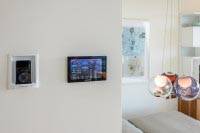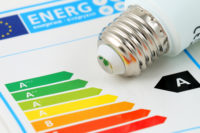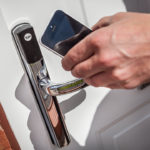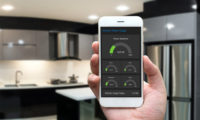- Selling
- Buying
- Landlords
- B&R Landlord hub
- Management services
- Vacant management
- Landlord reviews
- Rental investment
- Furnishing and refurbishment
- Yield calculator
- Free online valuation
- Stamp duty calculator
- ROI calculator
- Landlord resources
- EPC guide
- Video hub
- Area guides
- Fees for landlord
- Lettings Laws
- Why choose Benham and Reeves
- Renting
- New homes
- House prices
- International services
International offices
China, Hong Kong SAR, India, Indonesia, Malaysia, Middle East, Pakistan, Qatar, Singapore, South Africa, Thailand and Turkey
Learn more - Contact
- News
- Contact
- About us
- My B&R
Smart lets and the smart home tech revolution
- Landlords news
- 12.10.17
- Benham and Reeves
|
Getting your Trinity Audio player ready...
|
A significant consideration for any landlord is how to provide the best, most desirable property to attract high-calibre professional tenants. Having the competitive advantage these days is not just about the location, facilities and decor of your property however, it is increasingly about what smart home technology is included in the package.

‘Smart homes’, as they are known, are changing the way landlords and developers are thinking about the functioning and design of their properties, with manufacturers following suit with a suite of products to make home management easier. If this is a new area for you, then you aren’t alone and it’s one of the reasons why events like the Smart Home Summit are gaining in popularity. It is a two-day event that showcases cutting-edge technology and gives buyers chance to sample and buy. More than 1,500 attendees and 180 speakers from across the smart tech industry came to the event and it’s still only in its third year. With everything from exhibitions of tablet-controlled toasters to panel debates about consumer savings and personalisation, it is a great opportunity for landlords to see what could work well in their properties.
If you didn’t manage to get to this summit though, there are more planned. In the meantime, here’s some handy tips on how you can turn your rental properties into the smart homes of the future.
What is the smart home?
You’ve heard about it in the media, seen products on shelves in stores and you maybe even own one or two pieces of smart kit yourself. But what exactly is smart home technology?
The world of the smart home is one of the fastest-growing sectors of the tech universe. Put simply, the smart home is a network of electronic appliances and gadgets which can be controlled remotely from a device through an Internet-style network, more commonly known as the ‘Internet of Things’.
The aim is to enable the automation of repetitive or time-intensive household tasks, whether that’s a mundane job like drawing the curtains when the sun sets or a more complex task like triggering an alarm if an intruder enters when you’re away on holiday.
 Almost everything in a smart home from crucial appliances such as washing machines and central heating to leisure items such as televisions can be given this technological treatment. The major appeal of the smart home, to tenants at least, is the convenience that’s offered by centralised, electronic control of appliances. Whether it’s Panasonic’s proposed fridge on wheels which runs up to the sofa at the touch of a button or the voice-controlled Nest thermostat which can be turned up or down just by speaking, rental properties with smart home applications will become more and more appealing to tenants and therefore, have the potential for higher rental values.
Almost everything in a smart home from crucial appliances such as washing machines and central heating to leisure items such as televisions can be given this technological treatment. The major appeal of the smart home, to tenants at least, is the convenience that’s offered by centralised, electronic control of appliances. Whether it’s Panasonic’s proposed fridge on wheels which runs up to the sofa at the touch of a button or the voice-controlled Nest thermostat which can be turned up or down just by speaking, rental properties with smart home applications will become more and more appealing to tenants and therefore, have the potential for higher rental values.
Drawbacks?
Most smart home tech is better suited to modern builds but that doesn’t rule out period properties which can easily be adapted with infrared connectivity rather than cables. Another thing to consider is that the aim is for the smart technologies to learn the householder’s needs and behaviours and act on them without needing to prompt – a process known as artificial intelligence. Landlords may well have to reset the smart system for each new tenancy. Then there is the initial outlay and maintenance of the systems to consider – so is it all really worth it?
Smart homes are the future
Definitely, if you want to increase the desirability of your property. The one key takeaway from the Smart Home Summit was that home system management technology of this sort is rising in popularity and will soon be a standard expectation of every professional tenant.
Alex Davies, Editor of Riot (Rethink Internet of Things) agrees: “Smart home technology, when done well, would provide a landlord with the ability to bring a premium ‘touchless’ experience to a rental property – able to create a home in sync with its occupants. As well as the quality-of-experience improvements, there are major security and maintenance improvements to be had, such as automated leak detection and shut-off, energy consumption analytics and connected security alarms.”
Amazon’s Alexa, for example, is an intelligent personal assistant product range. Alexa currently recognises 95% of language, but in the next couple of years the software is set to become so advanced that it will recognise 99% of everything that is said in its presence. Tenants would surely be happy to pay more for what is effectively a robot butler?
 In a recent report, PricewaterhouseCoopers found that London was Europe’s best city for smart technology on measures like infrastructure readiness and unmanned transport, and second in the world only to Singapore. It stands to reason that as students and workers from all over the world come to London, they expect a degree of smart home technology in their apartments. London is embracing the possibilities of the smart technology and so too are its tenants. Landlords who recognise this and act now to equip their homes with smart technology will be the ones who can charge higher rental premiums.
In a recent report, PricewaterhouseCoopers found that London was Europe’s best city for smart technology on measures like infrastructure readiness and unmanned transport, and second in the world only to Singapore. It stands to reason that as students and workers from all over the world come to London, they expect a degree of smart home technology in their apartments. London is embracing the possibilities of the smart technology and so too are its tenants. Landlords who recognise this and act now to equip their homes with smart technology will be the ones who can charge higher rental premiums.
Ideal for landlords
An integrated and connected smart home will soon become an expected modern convenience, rather than a luxury. As one Smart Home Summit attendee observed, there are already eight O2 branches selling O2 Home products as well as 500,000 users of British Gas’ Hive smart thermostat – and with big firms like John Lewis aiming to position themselves as the number one smart home retailer, the consumer market is only going to grow for smart technology.
IKEA too has launched a smart home range of lighting that can integrate with Amazon Alexa, Google Assistant, Apple’s Home app and Siri simply through voice commands. Björn Block, Business Leader for IKEA Home Smart says: “We have solutions for dimming, switching from warm to cold light, remote steering and personalisation of light and a TRÅDFRI app that enables people to design the lighting they want through their phone or tablet. Most of all, we want to challenge the perception that this sort of technology is niche or complicated or expensive so we set out to make our smart lighting solutions easy to use and affordable for everyone. Smart home technology is not about making gadgets. It’s about adding functionality.”
And the smart home trend is heading only in one direction – and for savvy landlords, getting ahead of the curve and turning your properties into smart homes will bring plenty of benefits.
 By using technology to manage appliance usage, your place can become more energy efficient – something that will show your property in a good light when it comes to the Energy Performance Certificate you’ll need if and when you eventually sell it.
By using technology to manage appliance usage, your place can become more energy efficient – something that will show your property in a good light when it comes to the Energy Performance Certificate you’ll need if and when you eventually sell it.
If you pay your tenant’s electricity and gas costs, the smart home has the potential to slash bills – and even if your tenants pay for utilities, marketing your property as a cash saving, value for money smart home is a great sweetener that could push potential tenants just over the line. That’s not even taking into account smart home technology’s potential security uses.
Anthony Neary, Managing Director of safe.co.uk, a leading online retailer of home security products notes: “Sales figures indicate a clear increase in the purchasing of smart security devices and, due to their popularity, manufacturers have also increased the development of new products. It would seem that almost everybody has a smartphone now and people are clearly comfortable with controlling their home security via an app on their phone.
 “There are no running costs involved with the latest smart home security products which may persuade people to invest in a home security system where they would previously be put off by expensive monthly running costs charged by third-party security companies.
“There are no running costs involved with the latest smart home security products which may persuade people to invest in a home security system where they would previously be put off by expensive monthly running costs charged by third-party security companies.
“We’re just starting to see what the future of home security might look like. At the moment we have keyless locks that work with fobs or with your mobile phone allowing you to set alarms and disable them remotely if, for example, you want to allow workmen access to a property. In the future I envisage home security that combines some form of biorecognition such as an iris scan or thumbprint with your mobile so your front door will unlock as you approach it. Ultimately the internet of things will work together, so that as you get home, the kettle goes on, the lights come on, the heating comes on.”
It’s a view that Johan Pedersen, Z-Wave Product Marketing Manager shares: “Smart home technology attracts tenants and offers landlords more efficient ways to manage their property. By installing smart locks in their rentals, landlords can lock and unlock a unit with their smartphone and allow temporary access to open the door for real estate agents or contractors. Smart security systems provide an additional layer of protection for tenants and sends notifications when motion or sound is detected. By placing smart sensors throughout their buildings, landlords can receive an alert when water, smoke or abnormal temperature is detected to resolve issues before they become substantial problems. Z-Wave offers a lot of solutions to the MDU or smart apartment. It is a mature, open standard with many devices to choose from and it allows multiple devices to be controlled by one gateway in an apartment and offer a cohesive experience.”
Pedersen echoes what the speakers at the Smart Home Summit repeatedly found: successful home automation works when it adds value to the end user’s life – and substantial cost savings on bills are significant and add value to the property.
Smart tech for high-end lettings
 What’s more, landlords involved in the serviced or high end market sectors can particularly benefit from ensuring that the homes they let are smart. Those landlords who are looking to attract corporate tenants (residents whose companies cover their accommodation expenses and organise a place for them to stay) need to ensure their properties are managed professionally, and as a result there are significant cost-savings to be made.
What’s more, landlords involved in the serviced or high end market sectors can particularly benefit from ensuring that the homes they let are smart. Those landlords who are looking to attract corporate tenants (residents whose companies cover their accommodation expenses and organise a place for them to stay) need to ensure their properties are managed professionally, and as a result there are significant cost-savings to be made.
Smart technology can cut down on many of the outlays associated with maintaining high end properties. For example, centrally controlled robot vacuum cleaners require less housekeeping staff than traditional hoovers do, while artificially intelligent thermostats can keep the property comfortable and warm without leaving your heating systems running all day.
Not only that, the upmarket innovations associated with smart home technology will appeal to those professional tenants who are looking to boost their quality of life. Even your slice of toast in the morning can now be improved by smart tech.
Questions still remain
When it comes to smart technology, there are some understandable concerns about the security and safety of data. With many high profile data breaches hitting the headlines around the world over the last year or two, a media frenzy has emerged around how our information is used, stored and erased in the digital age.
And as João Bocas – a wearables expert who spoke at the Smart Home Summit – said, the innovations of the future should be all about humanity slotting into technology, not the other way round. As the manufacturers behind smart home technology develop new products, it will be necessary for them to ensure they stay on top of data security.
 There are also concerns about whether or not smart tech is beneficial to the wider world, and whether it’s for social good. While there might be specific benefits to consumers, there’s a sense among some observers that the world of smart data is simply there to line the pockets of the companies who harvest data. After all, your smart home knows all sorts of things about you from what time of day you head out for a run to how often you put the kettle on – and that sort of information can be valuable if it falls into the hands of advertisers and marketers.
There are also concerns about whether or not smart tech is beneficial to the wider world, and whether it’s for social good. While there might be specific benefits to consumers, there’s a sense among some observers that the world of smart data is simply there to line the pockets of the companies who harvest data. After all, your smart home knows all sorts of things about you from what time of day you head out for a run to how often you put the kettle on – and that sort of information can be valuable if it falls into the hands of advertisers and marketers.
As Arup’s Digital Cities Lead Steve Turner points out, it’s vital to use the data amassed from smart homes to create services as well. By ensuring the corridors, streets and public squares our flats and houses sit on are as smart as our homes themselves, the data can be harnessed by this incredible technology for the good of the community as well as the good of the consumer.
Delegates at the Smart Home Summit also agreed that it’s necessary to make sure that all sectors of the community benefit from smart home technology. For example, no matter what location or price band a property is in, tenants with disabilities could have their lives transformed if more smart home technology was developed to enable assisted living.
The world of smart home technology is growing and evolving, and it’s definitely something landlords should consider now. Whether it’s the cost savings delivered to tenants and homeowners, the added value smart home technology can give to properties, or the lower climate impact smart equipment can have, it’s clear that the smart home revolution is already bringing huge benefits to residents, landlords and communities.
Sign up to our newsletter
Subscribe
How much is your property worth?














